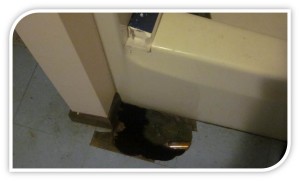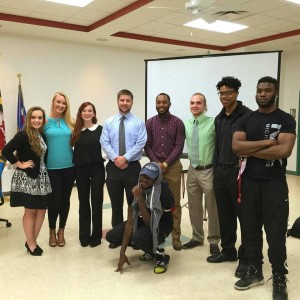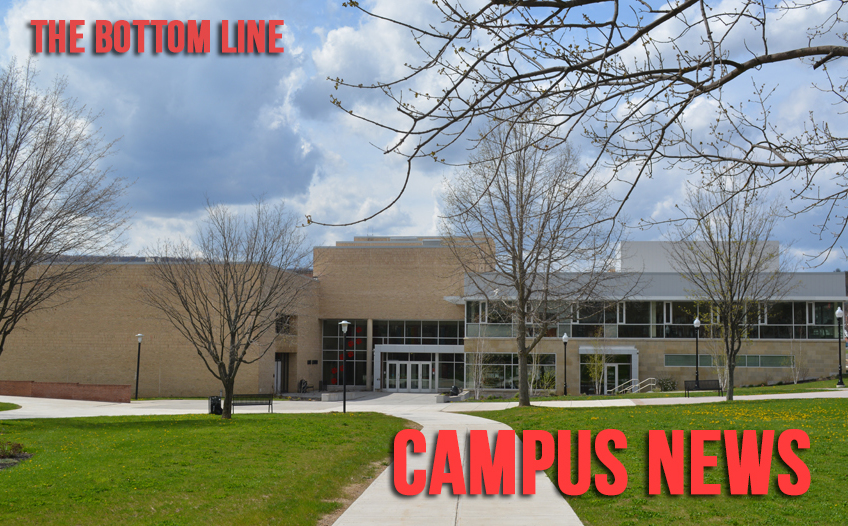City of Frostburg Data Says 700 Residential Rental Properties are Out of Compliance with Inspection Schedule
According to data provided by the City of Frostburg, over 700 residential rental properties are out of compliance with Frostburg’s rental housing code, which mandates that inspections occur once every three years.
This represents over 75 percent of the rental properties in Frostburg.
A spreadsheet provided by City Hall indicated that the last inspection of a residential rental property occurred on December 17, 2014.
In order to evaluate the inspection of rental properties, The Bottom Line filed a Public Information Request on Thursday, February 25, 2016 to acquire related data. Thirty days later, on Friday, March 25, City Hall officials provided The Bottom Line with a number of requested documents.
However, the dataset provided was incomplete, entirely lacking up-to-date inspection results for 2015 and 2016.
Rental Housing Officer Laura McBride advised on April 5 that The Bottom Line file another Public Information Request to receive this data in “about two weeks,” despite the fact that this information was already requested in the first request. Two weeks later, on April 19, the data was still missing.
Maryland law states that public information requested as a result of a Public Information Act request must be provided within 30 days, “but there may be instances where an agency needs additional time to locate and review the requested records,” according to the Office of the Maryland Attorney General.
At press time on Sunday, May 1, 65 days after it was initially requested, this data still had not been provided.
As provided, the data indicates that no inspections have occurred since December 17, 2014, three months after the new rental housing code was enacted. However, McBride explained that “a lot” of inspections have occurred since then, but that the data is not computerized, due to the City Hall switching to a new database program in 2014. She said they had not begun using the new program until recently.
“All the data entry has not been put into that new system, because we’re still basically testing it,” McBride said.
A link to a spreadsheet containing a list of rental properties, with their landlord and the date of the last inspection can be found here.
Another spreadsheet containing rental property and landlord information can be found here.
What the Data Tells Us
The data provided does indicate that there are 930 rental properties and 1,872 rental units in Frostburg. The rental housing code defines a rental unit as “any dwelling unit not occupied solely by the owner or the owner with the owner’s relatives by blood, adoption or marriage as a primary residence.”
As provided, the data says that:
– 18 properties were inspected in 2014
– 193 properties were inspected in 2013
– 228 properties were inspected in 2012
– 211 properties were inspected in 2011
– 69 properties were inspected in 2010
– 68 properties were inspected in 2009
– 24 properties were inspected in 2008
– 48 properties were last inspected before 2008.
For 71 properties, no date of last inspection has been listed.

After peaking in 2012 – when Mark Monnet was still on City Hall’s staff as an in-house inspector – the number of inspections sharply declined in 2014, the same year the decision was made to outsource inspections to private companies, according to the data. Although, inspections weren’t outsourced until September of 2014.
According to the dataset, one property, 13 Park Avenue, owned by Randy Winebrenner, Sr., hasn’t been inspected since 1997.
McBride reiterated that inspections have taken place, but no record of this has been provided, despite multiple requests.
A1 Inspections is one of the two private inspection companies licensed to inspect Frostburg rental properties, according to McBride. When asked whether A1 Inspections recorded and maintained inspection data, Ray Bell said that “City Hall should have that. Everything goes through City Hall.”
Megco Inspections, the other company McBride said is licensed to inspect Frostburg rental properties, declined to comment on this story and said to refer all questions about inspections to City Hall.
From January 2011 through December 2014, 650 properties were inspected, and 162 violations were found, according to the inspection data report.
City Hall only has aggregate data on inspections, according to McBride. She said that City Hall does not have inspection data listed by property, so it’s impossible to see which violations were found at which properties.

The most prevalent violations were:
– Not having a mounted kitchen fire extinguisher (27)
– Not having a functional fire extinguisher (19)
– Lacking an adequate emergency escape in a bedroom (14)
– Having a missing or broken ground fault circuit interrupter in the kitchen (14)
– Missing a smoke detector (12).
Nineteen violations relating to electrical systems were found.
Only one property received a violation for an issue with the heating system. No violations for an infestation of mold, bugs, or rodents were found.
The PDF, as provided by City Hall, can be found here. The full spreadsheet, transposed by The Bottom Line, can be found here.
During this same time frame, 1,644 code violations were found. These include non-rental properties, and the violation categories focus on exterior issues that can be seen plainly from the outside.
The most prevalent of these are:
– Having loose trash on property (317)
– Not storing rubbish out of sight (264)
– Not storing rubbish/garbage in leakproof container (242)
– Grass/weeds issues (137)
– Rubbish being out on the wrong day (82).
The original PDF, provided by City Hall can be found here, and the full spreadsheet for code violations, transposed by The Bottom Line, can be found here.
Data provided by City Hall also showed how many rental units were owned by each landlord.
– 136 rental units are owned by Frostburg Mayor Bob Flanigan.
– 110 rental units are owned by Rebecca Brown-McCusker of Diakon Lutheran Social Ministries, which are a part of the Frostburg Heights senior housing community.
– 100 rental units are owned by Laurie Mason, executive director of the Frostburg Housing Authority. FHA’s website says they strive to offer “decent, safe and affordable housing solutions and supportive services for low-income families, seniors, and those with disabilities.”
– 95 units are owned by Brandon Reece, who is affiliated with Evergreen Associates, Welsh Hill Commons, and V.E.I. Frostburg
– 60 units are Peter Fayne of Legacy Management Group.
– 52 units are owner by Raymond Unger.
– 47 units are owned by Bill Bond of ATB, LLC.
– 30 units are owned by John Steele.
– 26 units are owned by Leroy Pullen.
– 2 units are owned by Donald Carter J.R., Frostburg’s Finance Commissioner.
Inspection Duties Outsourced to Private Companies
Since December 2014, no Frostburg City employee has regularly inspected residential rental properties, a task that has been outsourced to two private contractors.
Until then, City Hall employed an in-house inspector, Mark Monnet, who regularly inspected properties.
Megco Inspections, based in Keyser, W.Va., and A1 Inspections, based in Cumberland, Md., are currently the only two companies licensed to conduct inspections. Ray Bell of A1 Inspections said they began inspecting Frostburg rental properties in June 2015.
A representative for Megco Inspections declined to comment and said to refer all questions to City Hall.
McBride explained that the policy “gives landlords the choice of who they want to use as an inspector, yet because they’re impartial, third party inspectors, there’s no favoritism or anything like that.”
These inspectors are licensed to inspect properties in the City of Frostburg by the Mayor and Council, according to the rental housing code.
Flanigan as Mayor and Landlord
Mayor Flanigan said he does not consider it a conflict of interest that he is both mayor and a landlord. However, he said, “As the Mayor, and a landlord with clean and safe properties, I understand the concern from our students.”
McBride also said that she does not consider it a conflict of interest.
Flanigan’s 136 rental units are distributed between Braddock Street, South Grant Street, Linden Street, and Welsh Hill, according to the provided data. The units are most concentrated on Braddock Street, where he owns 69 units.
“One of the first things I pushed for was safer housing for our students,” he said in an April 25 email to The Bottom Line. “We have come leaps and bounds from 2008.” Flanigan was elected Public Safety Commissioner in 2008.
“In 2009, the city changed up its inspection process,” he said. “Today we inspect properties every three years for life and safety codes. And the same is true nationwide.”
Flanigan said he and his family entered the rental business in 1993 when he was a full time city police officer.
“Why? Because students were not being treated well in off-campus housing,” he said. “We built brand new buildings with sprinklers, smoke-detectors and fire extinguishers in every unit. We provided clean and safe-furnished housing.”
He added that he keeps “college hours” and that “I usually work late so if my kids need anything, they can stop over and I take care of it.”
Frostburg Rental Housing Code Gives More Control to Landlords
In 2014, Frostburg enacted a new rental housing code that outsourced inspection duties and arguably gave landlords more control of the inspection process.
Property owners and owner’s agents, who manage the properties for owners, are able to handpick their inspector from the list of two certified inspectors who are certified by the Mayor and Council.

Properties are required by the code to be inspected once every three years. Landlords are given 180 days of notice to arrange for an inspection. Inspectors are paid by landlords at the time of inspection at a standard rate set by the city, according to the rental housing code.
Dr. Kathleen Powell, a social work professor at Frostburg State University who conducted research on rental housing conditions as a part of her dissertation, feels that the revised policy puts too much power in the hands of the landlords.
“I have some concerns when you’re giving more landlords more ability to influence the inspection,” she said. “I think that gives the landlords more control over the process, and I think that’s a dangerous precedent. It leaves the city open to inconsistencies and irregularities in inspection. It leaves tenants vulnerable.”
McBride said she isn’t concerned that this process puts too much power in the hands of the landlords, “because the codes are established and that’s what we follow. So, the codes exist and they’re interpreted by professionals, and it’s really a black-and-white matter. There’s no leeway. There’s no way to get around that. And any inspector certified in this field would recognize that and enforce the matter to be repaired.”
Inspectors are certified based on “a significant amount of criteria,” McBride said. “They have to be knowledgeable in the area of inspection – and that is done by a certified state board style testing. So they all have to have their certifications in those testing areas. They also have to carry certain types of and certain amounts of insurance. And they obviously have to be familiar with our rental housing code.”
These inspectors must have International Code Council national certification in accordance with the International Property Maintenance Code. The rental housing code also requires that “each inspector shall obtain and maintain errors and omissions insurance with a minimum of $500,000 coverage and general liability insurance with a minimum of $1,000,000 coverage naming the City as an additional insured.”
“I would encourage everyone who has a bad experience and thinks there’s a deficiency in the process to contact me so we can make sure the process is being enacted the way it should,” McBride said. “If not, we potentially have a very dangerous situation on our hands.”
Oversight of Inspections Questioned
“The concern that I have about rental housing in Frostburg is that we don’t have sufficient oversight of it,” Powell said.
At an off-campus housing forum held on FSU’s campus on April 12, FSU students questioned the oversight of rental housing inspections. One student, Asean Townsend, expressed concern that, “She can have her [inspector] come in, close his eyes, and walk out.”
“There need to be more regulations on the inspectors,” said Erin Kroder in a later interview, questioning how inspectors can be held accountable. “Who’s making sure that houses are being inspected?”
Kroder and Townsend are two students working in Powell’s “Citizen Leader” class to influence change in the rental housing policy.
Ray Bell of A1 Inspections disputed allegations that inspections lacked rigor and thoroughness.
“Inspections are all the same,” he said. “Most of the problems you’re going to run into are caused by the students. Inspection wise, it’s not an issue. They are all done in three year increments as required.”
A representative for Megco Inspections declined to comment.
“Studentification” and “Ghettoization”
Powell voiced concern that the potential lack of oversight has led to the deterioration of rental housing, especially in rental properties that are student occupied.
According to Powell, the deterioration of property is concentrated in an area adjacent to campus and zoned for “multi-family dwellings” – in Frostburg’s case, student housing.
“If you just drive down Bowery Street and just look at the outside properties, you will see that deterioration, and sadly, much, although not all, of the deterioration of housing has happened with rental housing that is student occupied,” she said.
This concentrated deterioration is a possible result of “studentification,” a phenomenon in which a neighborhood in a college town converts from having a majority of owner-occupied residences to one dominated by multi-family rental occupancies, according to Powell. “It’s been described as a special kind of gentrification,” she said.
Studentification often, but not always, leads to the development of a student ghetto, she added.
“Ghettoization is not a positive thing,” she explained. “Studentification could be a positive thing, right? There’s nothing wrong with concentrated students in a neighborhood in theory. But if it leads to the deterioration of housing, if it leads to the weakening of neighborhood based institutions, then it can become problematic. And I would argue that’s what happened here in Frostburg.”
McBride disagreed with this characterization, calling it “offensive.”
Powell expressed concern that Frostburg has a lot of old houses – with old plumbing and old wiring – that might meet code, “but only minimally.”
“I can’t say that we have made a big initiative to modernize electrical systems in local homes but what we rely on is the established code, and there are minimum requirements for electrical systems,” McBride said. “If a system doesn’t meet code, it has to be brought up to standards, and while it’s true that some systems are older than others, they still have to meet a minimum safety standard.”
Officials Offer Advice for Student Tenants
Solving these problems falls on tenants, not just landlords and city officials, said McBride.
McBride offered advice for students looking to move into a rental property.
“Never sign a lease on a property site unseen,” she said. “Always go look at it. I know word of mouth is a very powerful method of finding a place to live. But it’s not enough. You have to see it yourself.”
She also encouraged students to involve their parents in the decision, because parents often have experience in apartment and house hunting, especially when it comes to understanding leases.
“I would encourage students to understand the gravity of entering into a legal agreement that is a lease, and to read it – every single word and ask questions on things that can be confusing,” she said.
Flanigan echoed McBride’s comments, saying, “An educated consumer is the best customer. Students who wish to live off campus should take a minute/hour and not sign for the first property they look at. Who, with good money to spend, doesn’t take time to check out a property, and see if it is decent to live in? Wouldn’t you as a consumer research the property?”
He added four specific pieces of advice for students:
- “Be a smart consumer and take time to view the product.”
- “Don’t sign a lease just because it’s close to where you are in relationship to where you need to be at 8 a.m.”
- “Research and read the lease.”
- “Utilities, are they included or are you responsible?”
Influencing Change through Student Activism

Powell pointed out that students could become more civically engaged in order to make a difference. At the public hearing held in September 2014 regarding the new rental code, only Powell and two landlords testified.
According to meeting minutes provided by City Hall, landlord George Bittner argued that the new code, filled with regulations, was “burdensome” to landlords. The other landlord, Thomas Marsh, advocated for inspections to be done every five years, and he suggested that more research be done before the code was passed.
Students weren’t present at this meeting, Powell said.
“Most students don’t vote in the city of Frostburg,” she said. “They’re not engaged in city politics. And yet, the decisions that are made by city government officials, elected and appointed, affect their lives. And they have not had a say.”
Powell did say that the city could do more to engage students.
FSU students in Powell’s “Citizen Leader” class have worked this semester to create a dialogue about off-campus housing.
On April 12, they held an on-campus forum for students to share their concerns about rental housing. There, students spoke out about a variety of perceived issues, including spotty heating units, potentially exploitative contracts, and insufficient oversight over inspections.
“We wanted to undertake rental housing and improve its quality,” said Eric Gontrum, a student in the class. Gontrum added that their goal is to “bring a light to these injustices” and “mobilize the students” to start a conversation about the quality of rental properties in Frostburg.
Three students shared a story about how they were allegedly told by Brenda Byrnes of A2Z Property Services that it was safe to live in their house despite a significant mold infestation. They said the house was closed down, and they moved into Cambridge Hall.
A2Z’s lawyer, Paul Kelly, did not return a request for comment.
Byrnes later told The Bottom Line that, “I had [an] environmental inspector come in and do a mold test for air quality in the house which was cleared.” She alleged that the roommates owed over $6,000 in rent and utilities.”
The property was later found in compliance, according to City Hall records. Byrnes said she assisted the tenants in getting temporary on-campus housing.
McBride did not comment on this case.
Nine days later, the student group attended a public meeting with the Mayor and Council, making a presentation on off-campus housing as a part of the scheduled agenda.
In response to their presentation, Flanigan thanked the students for their time and wished them luck for the rest of their semesters.
“I want you to concentrate on studying and finishing this semester,” Flanigan told the students.
He suggested working to create an “advisory board” that could meet next semester. The other city council members did not comment on the presentation.
Most of the students are graduating this semester.
Students stated that they felt that their presentation had fallen on deaf ears.
“I just wish that they didn’t let the information bounce off,” said Gabby Cousino, one of the students, in a later interview. “I wish that the information would have sunk in more than it actually did.”
“We didn’t come in trying to attack [Flanigan],” she said. “We didn’t come in trying to attack anybody. We were coming in to give information to start change.”
Flanigan declined an interview with The Bottom Line at this meeting. Afterward, however, he frequently corresponded with The Bottom Line via email to provide comment on this story.
The students are, however, hoping to continue their advocacy into next semester. They have considered enlisting help from Student Government Association.
“We would welcome the opportunity to engage in a dialogue with students and do whatever possible to improve the quality of off-campus student life,” said SGA President James Kirk.
In an email to The Bottom Line, Flanigan said he would be “more than happy to meet with SGA and start an open dialogue about off-campus housing.”
“Make smart choices and don’t expect your failure in that process to be local government’s fault,” he added later.



